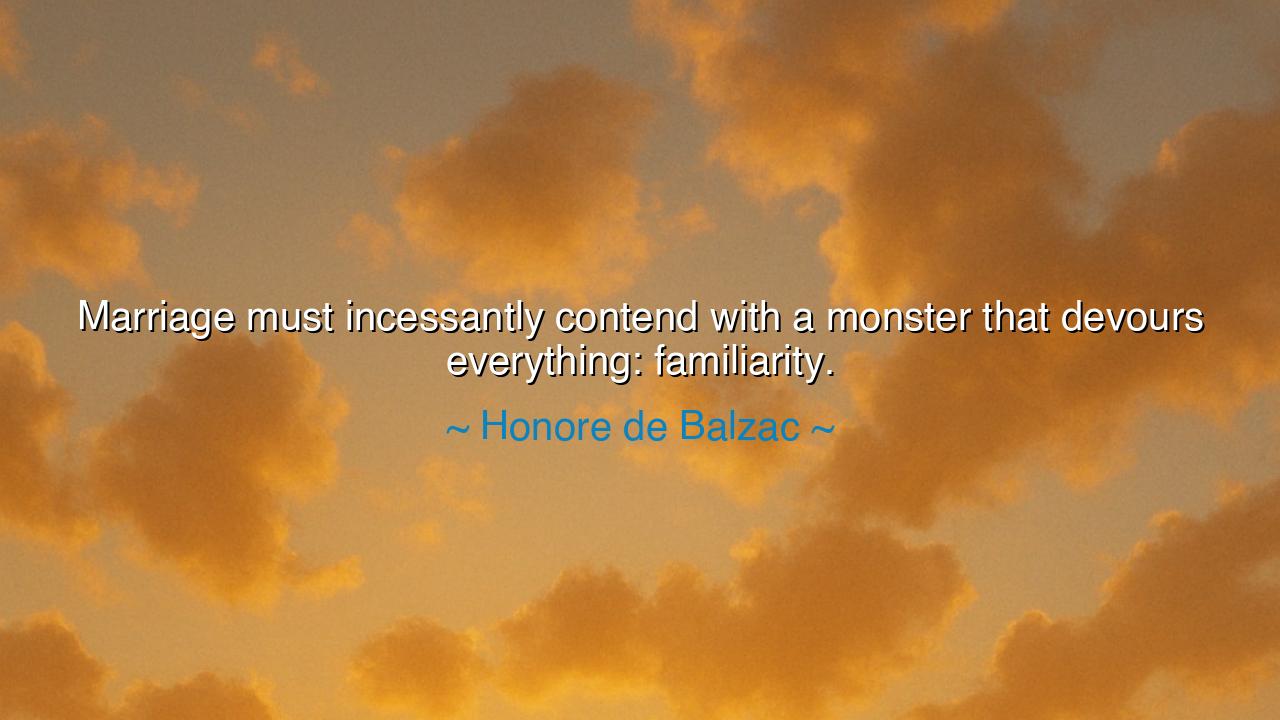
Marriage must incessantly contend with a monster that devours






The great French novelist Honoré de Balzac, who spent his life studying the passions, follies, and tragedies of men and women, spoke with piercing wisdom when he said: “Marriage must incessantly contend with a monster that devours everything: familiarity.” Here, in a single image, he reveals one of the oldest truths of love: that it is not great storms that most often destroy marriages, but the slow erosion of wonder, the creeping dullness of habit, the suffocating weight of familiarity. What once began in fire and mystery may, without vigilance, be consumed by routine.
This monster of familiarity is unlike others. It comes not with teeth bared or claws extended, but with quiet steps. At first, it feels harmless—comfortable routines, predictable gestures, words spoken without thought. But over time, it devours passion, diminishes admiration, and turns what was once luminous into something taken for granted. Balzac warns us that even the strongest marriages, if left untended, risk being swallowed by this hidden adversary.
History itself gives us living testimony. Consider the marriage of Napoleon and Josephine. At its birth, it blazed with passion; Napoleon’s letters, burning with desire, spoke of agony when parted from her. Yet as time passed, the familiarity of their union dulled his fervor. Ambition, routine, and dissatisfaction eroded their intimacy until the once-raging fire grew cold. Their story is a reminder that passion cannot survive on memory alone; it must be renewed against the gnawing of routine.
And yet, Balzac’s warning is not despair, but guidance. If familiarity is a monster, then love must be a warrior. Marriage requires courage to resist complacency, creativity to revive wonder, and humility to see one’s partner anew each day. To contend with familiarity is to treat love not as something static, but as something living, something that must be nourished, guarded, and refreshed continually. Without this vigilance, the bond weakens. With it, marriage endures with strength.
The ancients themselves understood this. The poets of Greece sang that love is like a flame—bright when fed, but fading when neglected. They urged lovers to keep alive the rituals of tenderness, the surprise of gifts, the sweetness of words not repeated by rote but spoken from the heart. Balzac, in his own way, repeats their teaching: do not allow your beloved to become invisible through routine. See them again and again as if for the first time, and thus deny the monster its feast.
The lesson for us is plain: do not mistake ease for love, nor habit for devotion. If you would keep your marriage alive, then fight against the slow creep of indifference. Set aside time for renewal, for joy, for rediscovery. Ask yourself daily: do I still look at my beloved with wonder? Do I still cherish them as I did at the beginning? If the answer falters, then the work of revival must begin at once.
Practical wisdom follows: take deliberate steps to nourish your bond. Speak words of gratitude often. Create shared adventures, no matter how small. Guard against the temptation to treat your partner as furniture in the room of your life—always present, rarely noticed. Instead, treat them as treasure, unique and irreplaceable. In doing so, you will starve the monster of familiarity and strengthen the fortress of your love.
Thus, let Balzac’s words endure as both warning and counsel: every marriage will face this devouring monster, but those who contend with it faithfully will preserve the beauty of their union. Love, when renewed daily, is stronger than routine. And in that vigilance, the sacred duet of marriage may continue to sing—not as a fading echo, but as a living harmony that endures through time.






AAdministratorAdministrator
Welcome, honored guests. Please leave a comment, we will respond soon